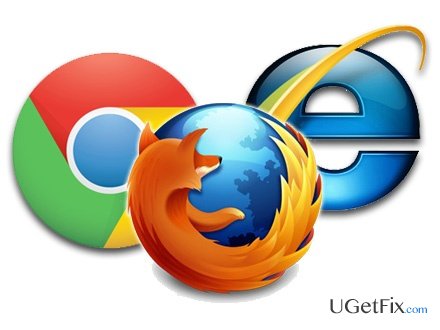
Nowadays, people spent on the Internet lots of time. Some of us probably the most of the day, i.e. at work, at home, on the bus, during free time, lunch, etc. Therefore, there is no doubt that people care about web browsers and their functions a lot since no one like being disrupted by continuous freezes, crashes, slowdowns, and similar issues. Each of use aim at using a fast, user-friendly, advanced, and, of course, secure web browser, so in this article we will present you with three best web browsers that are the best at the moment.
Web browsing industry and all its standards have been shaken up in 2008 when Microsoft announced that they are unhooking Internet Explorer from Windows OS. Such changes gave Google Chrome a quite easy way to the browser’s market. However, it did not take long for its rivals to investigate Google Chrome’s advantages, including a user-friendly interface, speed, advanced security and so on. However, Google Chrome’s glory has lasted for three years only since Mozilla Firefox reappeared on the market with a new design, advanced memory usage technique, handy optional browsing tools, and the all-bending speed.
Google Chrome and Mozilla Firefox have spent several years as PCMaf Editor’s Choice alternatively; therefore, both of them are considered to share first and the second places on the market at the moment. Nevertheless, Internet Explorer (11) is also competing with these two. So, if you are looking for a new web browser and cannot decide which one to use, we will give you a short reviews of each of aforementioned web browsers highlighting their custom settings, startup speed, privacy settings, security, and extension support.
Mozilla Firefox 40.0
According to our specialists, at the moment of writing Mozilla Firefox is worth first place since it features:
- New modern design, which reminds slightly the one of Google Chrome. The idea of the design has been borrowed from the Android and is assumed to have no concurrent in the market now.
- Tons of new standards support. The new Firefox version supports lion’s share of HTML5 features, WebRTC, Emscripten, asm.js, Web Audio API, 30 other Web APIs, the faster SPDY replacement for HTTP, and many other Web technology innovations.
- Syncing. Firefox is praised for allowing users to see bookmarks and settings whenever they want and on whatever device they need. The new version of this browser now even allows to continue browsing from the machine to machine.
- Good security and privacy. Phishing and malware protection, integration with antivirus software, separation of search box and address box, Content Security Policy (CSP), Do Not Track system, and other advantages, which makes Mozilla Firefox the safest web browser in the market.
- Customizability. Lots of innovations in custom settings, much more space for the user to select.
- Speed. Although Google Chrome is still considered to be the leader in speed, Mozilla Firefox has also showed great results.
- Cross-platform.
- Built-in PDF viewer, which means that you will never have to update PDF viewer. This decreases the chance of slipping on fake PDF update prompt.
- Independence from large data-mining vendors.
- The host of developer tools.
- Memory usage. Mozilla Firefox has been criticized for taking much memory CPU, this problem has already been solved. According to the recent research, it takes the least amount of memory if compared to Google Chrome, Mozilla Firefox, and Opera.
Despite all the positive sides listed above, Firefox is still not perfect. Users have already felt the lack of Flash support. Besides, it has no 64-bit version and does not support modern Windows 8 version. Not to mention, it does not support syncing for iOS devices.
Google Chrome 36
We have tested Google Chrome 36 and can claim that it’s one of the best-developed web browsers that features:
- Speed – still the most impressive Google Chrome’s feature.
- Voice search. This browser is the ONLY one that supports Google Voice Search.
- Leading support for HTML 5, including CSS Path drawing and CSS Selectors.
- High-security level. Its vulnerabilities are practically unexplainable due to integrated Flash update system, anti-malware and anti-phishing protection.
- Syncing of bookmarks and browsing history. In contrast to Firefox, Google Chrome allows synching among Chrome users on iOS and desktop, while Firefox cannot offer iOS sync.
- Built-in Flash player and PDF reader. The first browser that will not require you to update Flash and PDF reader, which is an excellent idea!
- Deliberate supply of extensions. Availability of extension usage even when on incognito mode. Other browsers usually disable all extensions when switching to the private browsing, which is not clever at all since you may need a spell checker, ad-blocker, translator or another app.
- Compatibility. Google Chrome supports a real-time streaming media standard, WebRTC, JavaScript APIs and other new standards.
- Rare page display issues. During Google Chrome’s test, none of the nonfunctional pages has been encountered. In some of the cases, users might get “Aww, snap!” error notification when rendering PCMag.com.
Disadvantages:
Although we’ve mentioned that Google Chrome has always been praised for speed, it seems that JavaScript performance that it uses is no longer the fastest on the market. Besides, the browser does not offer Do Not Track privacy feature and may sometimes crash when opening minor websites that it’s not compatible with. Even more, Chrome is blamed for huge memory consumption.
Internet Explorer 11
Internet Explorer has been the most popular web browser for ages. However, with the emergence of new web browsers, it lost its glory and had to go a long way to get it back. Internet Explorer’s new version now features:
- Faster and more standards-compliant than ever. Internet Explorer is the first web browser that uses so-called ‘hardware acceleration’ strategy. As developers of this browser stated, they seek to “blur the lines between applications and websites, making the latter every bit as powerful and “performant.””
- Minimal interface. Browser’s interface is minimized in order to give more space to the web content thus making Internet Explorer looking modern.
- Excellent security and privacy features. High-quality malware protection. Includes the whole menu for Security, including SmartScreen Filter, Do Not Track function, the block of third-party interactions and cookie and other features. According to NSS Labs, Internet Explorer has detected 99 percent of encountered malware.
- Site pinning for frequently used Web applications.
- WebGL and SPDY support that replaces standard HTTP Web communication protocol (on Windows 8 and 8.1).
Disadvantages:
The Internet Explorer offers no syncing, which is very well developed in Google Chrome and Mozilla Firefox. Besides, Internet Explorer is also very limited when it comes to the platform support and new standard support. Besides, it is the second web browser that uses the most memory surpassing only Opera at this point.
To conclude, it can be said that all web browsers, including Mozilla Firefox, Google Chrome, and Internet Explorer has both strong and weak sides. Therefore, it’s up to you which one to use! So good luck in selecting the best!



